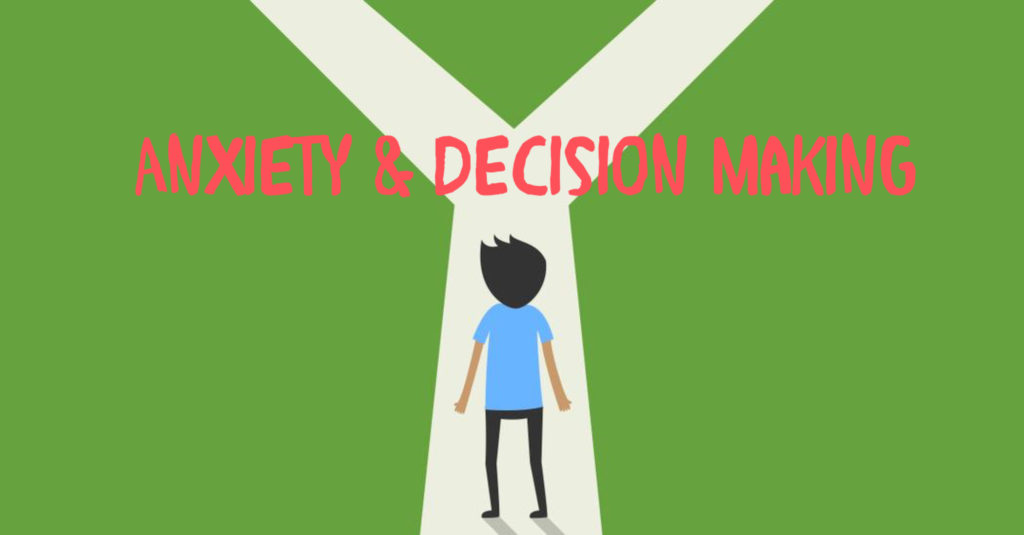Anxiety & Decision Making | Orlando CBT Therapist Shares 5 Tips
 For many individuals, making a decision is difficult and can bring on a great deal of anxiety and frustration. Making a decision whether to accept a job offer, go out with a new person, or move to a new city can make us procrastinate, keep us up all night and seek constant reassurance from our family and friends. “What would you do?” “Do you think I’m making the right choice?” “Are you sure that’s what you would do?” Because we want to make the perfect decision, we postpone and second-guess our choice, which all leads to more anxiety.
For many individuals, making a decision is difficult and can bring on a great deal of anxiety and frustration. Making a decision whether to accept a job offer, go out with a new person, or move to a new city can make us procrastinate, keep us up all night and seek constant reassurance from our family and friends. “What would you do?” “Do you think I’m making the right choice?” “Are you sure that’s what you would do?” Because we want to make the perfect decision, we postpone and second-guess our choice, which all leads to more anxiety.
Freezing Up
Research published in the Journal of Neuroscience found that anxiety disengages the prefrontal cortex, the part of the brain that is responsible for decision-making, attention and rational thinking. This isn’t surprising, as we can probably all attest that we have a difficult time thinking clearly when we are in the middle of an anxiety provoking situation.
Many individuals with anxiety often freeze up when they have to make a decision. The decision can be a big one, like where to get medical treatment or how best to invest your retirement fund, but it can also be a fairly mundane decision, like what to order at a restaurant. Anxious people have a hard time with these decisions mainly because they tend to fixate on all the possible negative outcomes.
A Harvard study found that when faced with making a big decision, individuals who were highly anxious were found to lack clear judgment and were more likely to ask others for advice on what they should do. Interestingly, it was also determined that anxiety impaired the anxious individuals ability to accurately judge the quality of the advice they were given.
According to Cognitive Behavioral Therapy (CBT) theory, anxious individuals have a difficult time making decisions because they have more trouble accepting life’s uncertainties. They often catastrophize about the future and feel that unpredictability and uncertainty are horrible experiences that must be avoided at all cost. For these individuals, decisions are difficult and confusing and decision-making can lead to anxiety and regret even after the decision has been made.
Good decision-making is an important skill that can be developed. Here are five strategies to help you make decisions, both big and small:
- Accept that some decisions will not work out as expected. No matter how hard you think about your decision, no matter how many people’s advice you consider, some decisions just will not work out. There are a million decisions we will make in a lifetime, all leading to different outcomes, not all of them good. This doesn’t mean you made a stupid or wrong decision, it just means that the unexpected happened. Accept that you’ll be disappointed, but don’t beat yourself up or blame yourself for what went wrong.
- Evaluate the Pros and Cons. Think about the possible negative and positive outcomes of your decision and write down the pros and cons for each, with the most important point at the top of the list. Do the cons outweigh the pros?
- Make a “Good Enough” Decision. The availability of too much information and too many choices can lead to “analysis paralysis”, which means a great deal of time is spent on researching, gathering information, thinking about it, while no decision gets made. More thinking is not always better thinking. Instead, make a decision that you could live with, that you would consider good enough.
- Use your Intuition. Intuition isn’t a magical sixth sense, it is actually a combination of your personal values and past experiences. When you’re using your intuition, your worldview and learning about life is reflected in your decision.
- Don’t Look Back. Remember that ultimately, any decision involves a leap of faith. Accept the path you have chosen and know that every decision we make, good or bad, is a part of our life’s journey.
Finding The Right Help
At The Center For Anxiety & OCD at GroundWork Counseling in Orlando our therapists and counselors use Cognitive Behavioral Therapy (CBT) strategies to reduce anxiety and help guide you toward informed, thoughtful decisions that encourage personal and professional growth. When you accept that uncertainty is inevitable and that you must make a decision even though you are uncertain, you will never get stuck.
Ready To Make A Change?
GroundWork is proud to offer both in-person &
virtual Telehealth appointments.
In-Person Sessions: Central Florida
Virtual Sessions: Florida, Maine, South Carolina, Montana, Vermont

